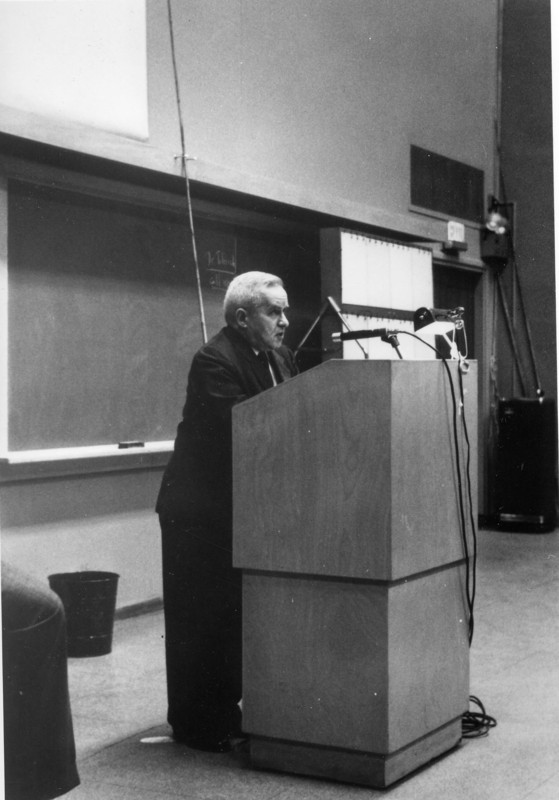Teacher
Another large group of people to come under Dr. Finland’s influence were the students and house officers of the Harvard Medical Services at the Boston City. Weekly infectious disease rounds were widely attended and in fact embraced the entire hospital. Often, distinguished visitors, many of whom were former fellows, made part of the group. Attending rounds, when Dr. Finland would see each patient on the ward if only for a few kind words, were models of teaching the art of patient care as well as the scholarly and scientific aspects of medicine. Never was the care of each patient in any way neglected . . .complaints so often heard that professors of academic medicine are not interested in patients but only in their diseases have never applied to this scholar and physician.
Charles Davidson, M.D.
William Bosworth Castle Professor of Medicine
Harvard Medical School
Presentation of the George M. Kober Medal for
1978 to Maxwell Finland
Max was not a good lecturer. He crowded too many figures on to slides and provided the lesson to students in a manner that was dry and uninteresting for many. Few second or third year Harvard Medical students recognized that he was one of the key figures in infectious diseases in the country and was recognized and respected by colleagues world-wide. One year in the 1960s, when I was serving as a laboratory instructor in the second year course in microbiology, the lecture schedule was arranged so that there were consecutive lectures by the most renown of Harvard Professors of Microbiology and Infectious Diseases. It happened that each was less than an exciting lecturer. On Monday, Dr. Enders described the Nobel Prize winning work of development of roller tubes that lead to the development of the poliovirus vaccine. Very dry. Tuesday was Dr. Monroe Eaton, discoverer of the organism of atypical pneumonia, called by many the Eaton agent and later Mycoplasma Pneumoniae. More dry than Dr. Enders. Then Dr. Finland with a discussion of antibiotics that had the students overwhelmed with data. A student sitting next to me whispered – “Who are these guys? Why can’t Harvard get teachers who know their stuff!” Only later would that student realize the privilege of listening to those heroes of infectious diseases.
Jerome O. Klein, M.D.
Professor of Pediatrics
Boston University School of Medicine
31 August 2001
To make rounds with Max Finland was an extraordinary experience, providing us with lessons we’d never forget. I soon realized that the more you knew, the more you learned from Max. To be sure, he was not the most dynamic speaker; in fact he tended to mumble – a characteristic that reflected his intense shyness . . . despite his bashfulness, however, Max was entirely willing to share his vast knowledge, and to accompany him on rounds as he evaluated a patient with pneumococcal or mycoplasmal pneumonia was the ultimate privilege of an infection-disease trainee.
Dennis L. Kasper, M.D.
William Ellery Channing Professor of Medicine
Professor of Microbiology and Molecular Genetics
Executive Dean for Academic Programs Programs
Harvard Medical School
13 September 2001

